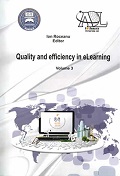CONTRIBUTIONS CONCERNING THE USE OF COMPUTER ASSISTED PROGRAMMED LEARNING IN THE THEORETICAL TRAINING OF PHISICAL EDUCATION AND SPORTS FOR STUDENTS FR
CONTRIBUTIONS CONCERNING THE USE OF COMPUTER ASSISTED PROGRAMMED LEARNING IN THE THEORETICAL TRAINING OF PHISICAL EDUCATION AND SPORTS FOR STUDENTS FR
Author(s): Liliana Becea, Raluca Anca PelinSubject(s): Education
Published by: Carol I National Defence University Publishing House
Keywords: programmed learning; computer assisted learning; theoretical training; physical education and sport; student
Summary/Abstract: Information is one of the most important factors in the process of human development as is briefly and eloquently expressed in the saying: "One wise man is worth ten rulers". Due to the specificities of the subjects, concise and complex information in higher-education heightens both the level of understanding as well as, indirectly, the degree of the subjects' participation in their own formative process. The students' responsiveness to information is directly proportional to their interest in the themes discussed. Theoretical training in physical education, a component of the instructiveeducative process, is a "rara avis" in all levels of education except for the specialized units. Planned instruction assisted by the computer represents an efficient solution which may contribute to the fulfilment of objects in physical education in higher-education systems from universities of a different profile where theoretical courses that might present the characteristics and effects of the practice of physical education are missing. This research has had several stages of development. In the first stage, the theoretical subjects were chosen according to the interest and importance attributed by the questioned students. Accordingly, they were presented in a mini-course of theoretical training that contained maximum information in a minimum amount of words. In the end, the information presented in this course was reorganized in sequences of planned instruction. The experiment for evaluation had two independent variables: the first was programmed assisted computer learning and the second was self-study. The dependent variable consisted in the theoretical knowledge gained which was evaluated through the direct application of an open-answer questionnaire by the operator.
Journal: Conference proceedings of »eLearning and Software for Education« (eLSE)
- Issue Year: 9/2013
- Issue No: 03
- Page Range: 33-38
- Page Count: 6
- Language: English

